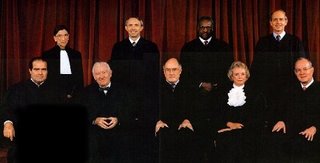Supreme Challenge

"Always remember, others may hate you, but those who hate you don't win unless you hate them, and then you destroy yourself."
--Richard M. Nixon
************************
In a landmark decision, the U.S. Supreme Court has ruled 5-3 that President Bush's military commissions established in 2001 to try detainees at Guantanamo Bay are not authorized by federal law. The commissions are basically kangaroo courts where detainees, after being held indefinitely, have virtually no rights, especially the right to meet with an attorney and the right to hear the evidence, even the charges, against them. Many Constitutional scholars and Democrats cheered the ruling as evidence that we have a sensible Supreme Court that stands up for the Consitution against unchecked executive power. They said that other Bush programs that were not authorized by Congress, such as the warrantless NSA spying program, will now need to be reviewed as well. They believe that our democracy is safe. These folks should not break out the champagne yet.
There are two important things to keep in mind in the wake of the Court's Hamdan v. Rumsfeld decision. First, one of the 9 Justices, Chief Justice John Roberts, had to recuse himself from the decision, because it was his appeals court decision that the Supreme Court was reviewing. We know that Roberts would have voted in favor of the military tribunals, since he ruled that way in his lower court decision. So that makes it 5-4. Second, the author of the Hamdan decision, Justice John Paul Stevens, is 86 years old. While he is reportedly in good health, Stevens could die or become incapacitated and be forced to retire at any time. That would give President Bush another Supreme Court pick, and, based on his previous picks of John Roberts and Samuel Alito, who voted with the minority to support Bush in Hamdan, we know that Bush would appoint another justice who would likely vote to support the executive branch, at least when it is Republican-run, virtually every time. If another Republican president is elected in 2008, when Stevens will be 88 years old, the likelihood of a conservative Supreme Court pick to replace Stevens during the ensuing 4 years becomes even more likely.
In other words, far from being a monolithic, balanced defender of the Constitution and bulwark against unchecked Presidential power, the Supreme Court is merely a group of nine highly political men and women picked by Presidents for the most political of reasons. Their balance and reasonableness is only as good as the balance and reasonableness of the Presidents who appoint them. If a string of Presidents of one party and one political philosophy is elected, and those Presidents are able to fill vacancies on the Supreme Court, the Court can be tilted to one side for many years. That should be alarming to conservatives, liberals and everyone in between. While a Supreme Court that upholds anything the President does may be quite appealing to conservatives now, I doubt they would be so pleased if the President were a Democrat, say, Hillary Clinton.
In short, the Hamdan decision could easily have gone the other way, and a similar case would be more likely to go the other way in the next two and a half years. Perhaps voters will keep that in mind when celebrating America's independence from a King named George today, and when Americans vote for a new President in 2008.




0 Comments:
Post a Comment
<< Home